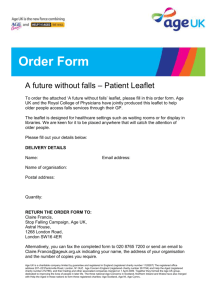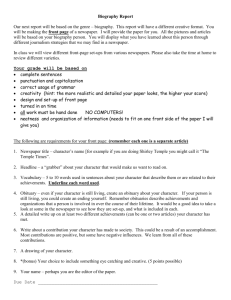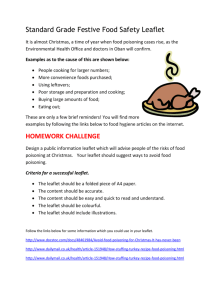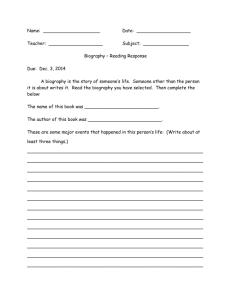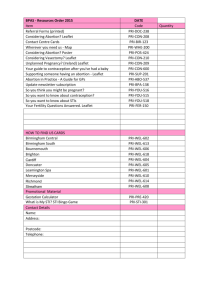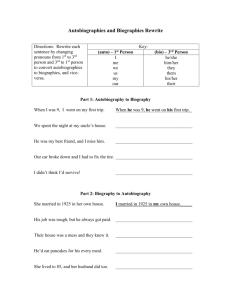100 Things to do with non-fiction and media texts
advertisement
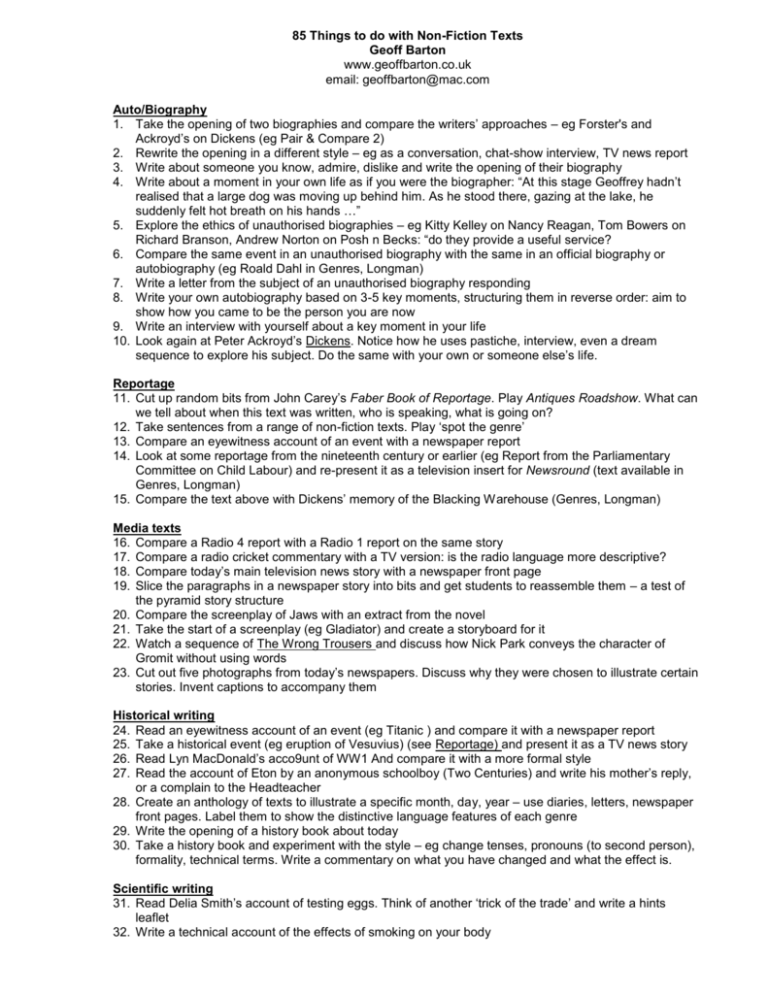
85 Things to do with Non-Fiction Texts Geoff Barton www.geoffbarton.co.uk email: geoffbarton@mac.com Auto/Biography 1. Take the opening of two biographies and compare the writers’ approaches – eg Forster's and Ackroyd’s on Dickens (eg Pair & Compare 2) 2. Rewrite the opening in a different style – eg as a conversation, chat-show interview, TV news report 3. Write about someone you know, admire, dislike and write the opening of their biography 4. Write about a moment in your own life as if you were the biographer: “At this stage Geoffrey hadn’t realised that a large dog was moving up behind him. As he stood there, gazing at the lake, he suddenly felt hot breath on his hands …” 5. Explore the ethics of unauthorised biographies – eg Kitty Kelley on Nancy Reagan, Tom Bowers on Richard Branson, Andrew Norton on Posh n Becks: “do they provide a useful service? 6. Compare the same event in an unauthorised biography with the same in an official biography or autobiography (eg Roald Dahl in Genres, Longman) 7. Write a letter from the subject of an unauthorised biography responding 8. Write your own autobiography based on 3-5 key moments, structuring them in reverse order: aim to show how you came to be the person you are now 9. Write an interview with yourself about a key moment in your life 10. Look again at Peter Ackroyd’s Dickens. Notice how he uses pastiche, interview, even a dream sequence to explore his subject. Do the same with your own or someone else’s life. Reportage 11. Cut up random bits from John Carey’s Faber Book of Reportage. Play Antiques Roadshow. What can we tell about when this text was written, who is speaking, what is going on? 12. Take sentences from a range of non-fiction texts. Play ‘spot the genre’ 13. Compare an eyewitness account of an event with a newspaper report 14. Look at some reportage from the nineteenth century or earlier (eg Report from the Parliamentary Committee on Child Labour) and re-present it as a television insert for Newsround (text available in Genres, Longman) 15. Compare the text above with Dickens’ memory of the Blacking Warehouse (Genres, Longman) Media texts 16. Compare a Radio 4 report with a Radio 1 report on the same story 17. Compare a radio cricket commentary with a TV version: is the radio language more descriptive? 18. Compare today’s main television news story with a newspaper front page 19. Slice the paragraphs in a newspaper story into bits and get students to reassemble them – a test of the pyramid story structure 20. Compare the screenplay of Jaws with an extract from the novel 21. Take the start of a screenplay (eg Gladiator) and create a storyboard for it 22. Watch a sequence of The Wrong Trousers and discuss how Nick Park conveys the character of Gromit without using words 23. Cut out five photographs from today’s newspapers. Discuss why they were chosen to illustrate certain stories. Invent captions to accompany them Historical writing 24. Read an eyewitness account of an event (eg Titanic ) and compare it with a newspaper report 25. Take a historical event (eg eruption of Vesuvius) (see Reportage) and present it as a TV news story 26. Read Lyn MacDonald’s acco9unt of WW1 And compare it with a more formal style 27. Read the account of Eton by an anonymous schoolboy (Two Centuries) and write his mother’s reply, or a complain to the Headteacher 28. Create an anthology of texts to illustrate a specific month, day, year – use diaries, letters, newspaper front pages. Label them to show the distinctive language features of each genre 29. Write the opening of a history book about today 30. Take a history book and experiment with the style – eg change tenses, pronouns (to second person), formality, technical terms. Write a commentary on what you have changed and what the effect is. Scientific writing 31. Read Delia Smith’s account of testing eggs. Think of another ‘trick of the trade’ and write a hints leaflet 32. Write a technical account of the effects of smoking on your body 33. Write an instruction sheet on a process – eg how to increase the RAM in a computer or how to clean your teeth 34. Read a historical account of a discovery (in John Carey’s Faber Book of Science Writing) and rewrite it for a modern audience 35. Take the same account and present it as a modern fact sheet, or in cartoon form 36. Create an internet site which answers common questions about science (eg how can I tell what is a fruit and what is a vegetable?) 37. Take the first paragraph of some scientific writing and rewrite it as the start of a story or diary. 38. Write an idiot’s guide on how to programme a video recorder 39. Read someone else’s idiot’s guide on how to programme a recorder; test it; give them feedback on how clear it is Specialist texts 40. Read a knitting magazine and rewrite one section for a general reader. 41. Read a fishing magazine and compile a glossary of technical terms 42. Create a specialist magazine article on a subject you know well 43. Find a magazine article written in a personal style. Rewrite it using the passive. 44. Read a set of computer instructions and re-design them as a one-page guide for a new computer user Leaflets 45. Compare healthy food leaflets from three supermarkets 46. Find a leaflet from a supermarket and find sentences that (a) entertain (b) inform and (c) persuade 47. Find the worst leaflet you can and write an advice sheet on how it could be improved in (a) language use and (b) design 48. Write a leaflet on how to study more effectively 49. Design a really boring leaflet on a boring topic and label it to show why it’s so bad Travel 50. Compare a writer’s journey to a country (eg Jonathan Raban in USA) with a holiday brochure 51. Write a description of the key features of holiday brochure style 52. Rewrite a holiday brochure without any adjectives or adverbs 53. Write a piece of travel writing about your journey to school 54. Read three holiday writers and compare the first paragraphs of their work 55. Write an instruction sheet on how to get from your classroom to the main Reception 56. Write a visitor’s guide to your town or village 57. Produce a 3-minute TV holiday slot on camping opportunities at your school! Cookery writing 58. Compare the way three writers structure their recipes 59. Write a restaurant review of your school meals 60. Interview the cook at your school about the way she cooks 61. Invent a new fast-food product and design a commercial or magazine advertisement for it 62. Do a taste test of 5 types of Cola/crisps and write a report of your findings 63. Write a review of the best meal you have ever had 64. Write an instruction leaflet on healthy eating Reviews 65. Write a review of a film you hated 66. Compare two CDs 67. Write a television review of a programme you watched last night – aim to entertain 68. Write a comparison of two TV critics’ reviews of the same programme 69. Write an introduction to your all-time favourite film 70. Discuss why we need critics 71. Write a book review which doesn’t contain more than three sentences about the storyline 72. Create a new format for book reviews which give readers essential information at a glance (eg startratings, key words) Sports 73. Write a football commentary about a match you watched on your school field 74. Write a profile of a sports star you admire – don’t start with the beginning of their life 75. Interview a sports player at your school 76. Listen to a radio sports commentary and analyse how it uses language 77. Write a factsheet about the essential qualities in a good football/netball/hockey/etc player 78. Write an instruction sheet, with diagrams, on how to play cricket. Aim it at a reader who knows nothing about the game! Internet 79. Design a test to compare three internet search engines 80. Write an introduction to the internet for a new user 81. Compare three internet sites on the same topic 82. Write a factsheet on how to use email 83. Design a website about yourself, your interests and your school 84. What are the essential ingredients of a good website? Create a poster or leaflet 85. Investigate internet and email language and writer a user’s guide GB October 2000
